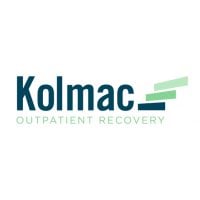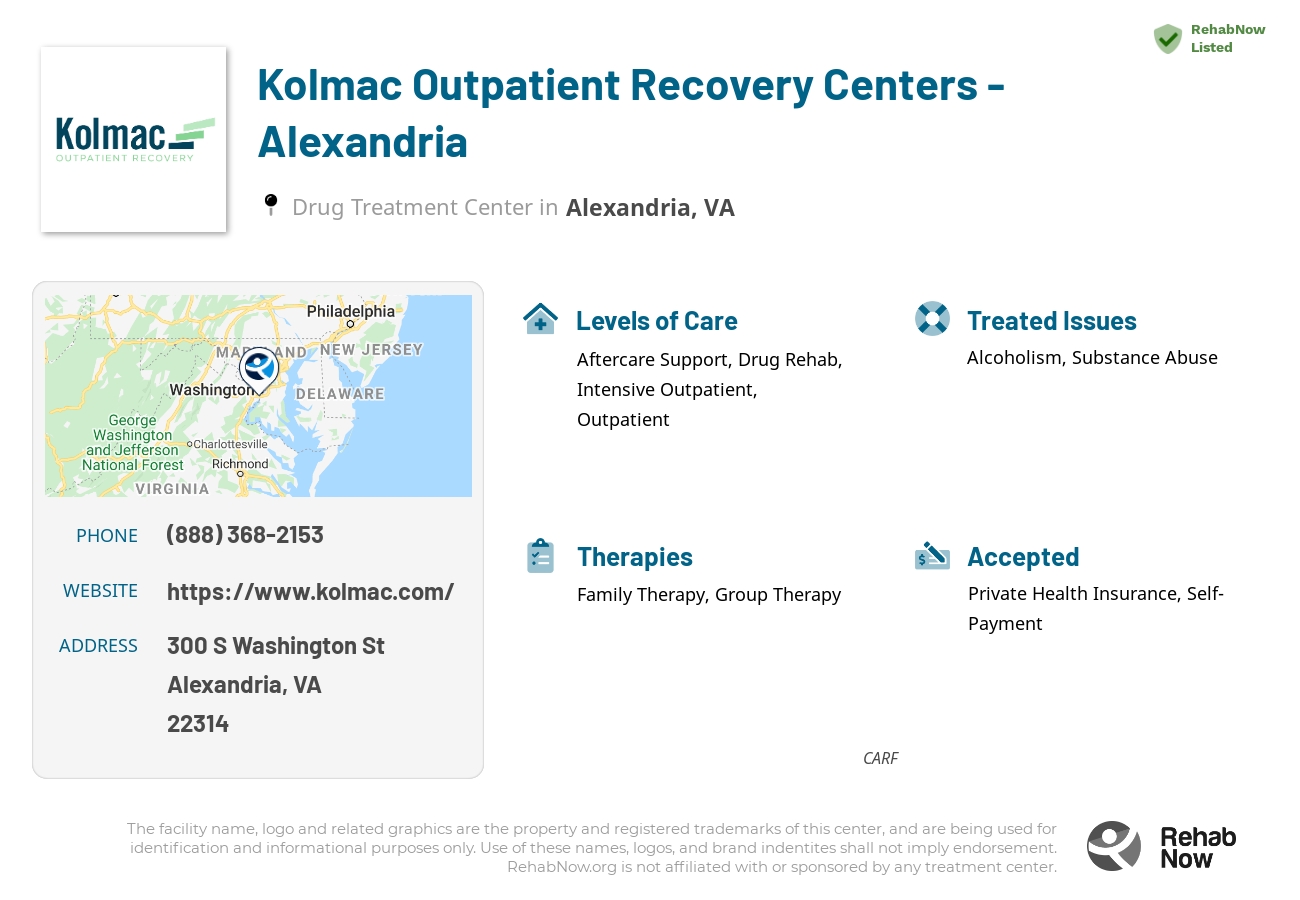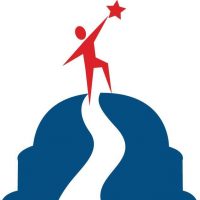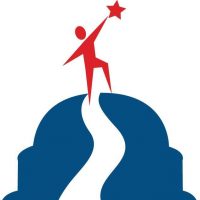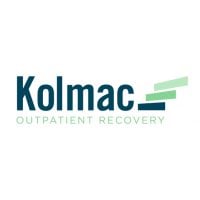Kolmac Outpatient Recovery Centers - Alexandria
Drug Rehab Center in Alexandria, Virginia
Kolmac Outpatient Recovery Centers in Alexandria, Virginia offers a comprehensive program to help individuals recover from alcoholism, substance abuse, and drug addiction through a range of services and state-of-the-art treatments.
About
Kolmac Outpatient Recovery Centers - Alexandria is an addiction treatment facility located in Alexandria, Virginia. They provide a variety of high-quality services to help people recovering from alcoholism, substance abuse and drug addiction. Their comprehensive program includes Aftercare Support, Intensive Outpatient Programs (IOPs) and Detox Programs as well as drugs rehab programs for those in need of more intensive care. Kolmac also provides Intervention Levels of Care for those families or individuals that seek assistance before the addiction gets out of control.
Kolmac offers a range of services designed to aid individuals in recovery from substance abuse and drug addiction. Each patient’s program can include state-of-the-art treatments such as cognitive behavior therapy, counselling sessions with experienced clinicians who understand the pain of withdrawal, group activities designed to build positive coping skills and family support systems that promote lasting healing . Kolmac also holds two major accreditations – LegitScript and CARF – assuring their highest standards regarding quality outcomes that are safe for all involved party’s health care needs during this tumultuous time*.
Genders
Ages
Modality
Additional
Accreditations

LegitScript

CARF
The Commission on Accreditation of Rehabilitation Facilities (CARF) is a non-profit organization that specifically accredits rehab organizations. Founded in 1966, CARF's, mission is to help service providers like rehab facilities maintain high standards of care.
Conditions and Issues Treated
Recovering from substance abuse is an essential part of a healthy life for many people. It’s a long and challenging process, but it can be worth it in the end if you manage to get through all parts. Detoxifying your body, rehabilitation after that time passes or when needed (depending on what type), and then recovery while also receiving therapy support throughout this entire process.
A standard route to starting recovering from substance abuse and addiction is through a detoxification center. There you can completely heal your body and mind and continue on the path of recovery without feeling any of the lingering effects of substances.
Levels of Care Offered
This center offers a variety of custom treatment tailored to individual recovery. Currently available are Aftercare Support, Detox, Drug Rehab, Intensive Outpatient, Intervention, Outpatient, with additional therapies available as listed below.
Detoxification is a critical first step in treatment for drug addiction. Drug detoxification helps the individual withdraw from the drug by providing a controlled environment where symptoms can be managed through medication and close observation. Detoxification is an inflection point where the individual can get on a recovery track, but it’s also one of the most dangerous points in the recovery process.
In addition to going through physical withdrawal from certain drugs, a detox program also provides the individual with drug testing to monitor their progress. This way, if the individual is not ready for sobriety (such as if they relapse), the treatment professionals can catch it early on and use that opportunity to help re-orient the individual towards recovery.
Intensive Outpatient Programs are similar to partial hospitalization, but they don’t require the patient to go home each night.
This means that while they have to attend meetings and receive other types of help at the facility, addicts are allowed to keep their jobs or continue with school without having to miss their classes or work opportunities. This is a great option for those who can’t take time away from their jobs or schedules to attend a treatment program.
During this type of program, the addict will be required to meet with counselors and other types of professionals throughout the day. This will help them stay on track and prevent them from relapsing after they leave the facility.
An outpatient treatment program is set up to help with alcohol or drug addiction or a co-occurring disorder. The treatment must attend the treatment facility for their therapy and other programs but return home each night. The frequency of mandatory attendance decreases after much of the treatment program is complete. The treatment programs are monitored by the treatment facility and case managers who work for a judge or judge’s office. A treatment program may be performed out of a treatment facility, treatment clinic, or treatment center.
The benefits of outpatient treatment programs are many. One of the most beneficial treatment programs is that it allows treatment for clients who cannot afford or may not be able to attend treatment at a treatment facility, treatment center, or treatment clinic full-time. Another benefit of treatment programs is that they reduce crime rates because treatment allows people to treat their addiction.
There are many different kinds of services that support and help people in recovery. Interventions help families and friends share feelings, express their desire for change, and plan for concrete steps toward recovery. Interventionists are trained professionals who assist family members in arranging an intervention or lead an intervention themselves. The family members should be involved in selecting an experienced professional to lead their loved one into treatment. Intervention services are available throughout the country.
Recovering drug addicts need aftercare support when they leave treatment. The support can include guidance through 12-step programs, outpatient rehabilitation programs, and support groups. Aftercare supports the individual in their desire to maintain sobriety by reducing relapse risk with positive choices.
The success of drug treatment does not end when the addict leaves the rehabilitation center. There is no such thing as a “one and done” type of rehabilitation process. Recovery is a lifelong journey that begins with treatment and continues by the addict committing to outside support groups or drug rehab programs.
When choosing a program, it is crucial to choose one that will provide long-term aftercare support. This ensures that you have the tools you need to sustain your recovery.
Therapies & Programs
Individualized Treatment is essential because it gives addicts the ability to participate in a program that meets their unique needs. An addict should work with professionals who understand what they’re going through, especially if the addict is actively using. Finding the right treatment program for an addict is difficult, but it’s even harder without communicating with those who have experience treating your specific situation.
The therapies typically involve all family members, potentially including siblings, children, and parents who play a role in their daily lives. These sessions can be essential because they address past issues that may have affected an addict or alcoholic’s recovery process. They provide support during this time when it is needed most!
A family therapy session, often called a family meeting or intervention, is a necessary process that helps loved ones of addicts see their situation in a new light. It’s also one of the most challenging things families will ever have to do when they’re facing a loved one battling addiction or alcoholism.
Group therapy sessions provide recovering addicts with a chance to cope with everyday situations that many face. Group therapy sessions are held in rehab facilities, clinics, churches or community centers that offer drug addiction treatment.
People who attend these groups are encouraged to voice their feelings and support other addicts in recovery. This helps group members strengthen their own recovery program while cheering on others who are struggling with sobriety.
Cognitive Behavioral Therapy (CBT) is a highly effective treatment option based on the idea that how we feel, think and act all interact together. Our thoughts determine our feelings and behaviors; our feelings affect our thoughts, and our behaviors change our thoughts and feelings. CBT helps people explore their thoughts for problems (or false beliefs) that influence their mood and actions. By examining their thoughts and beliefs, people can recognize distorted or irrational and modify them to more realistic, positive ones. CBT is very goal-oriented, which means that the therapist and patient work together on a specific problem while learning to become more adept at solving future problems.
CBT works well with a broad range of people, including those with depression, anxiety disorders, eating disorders, and problems with anger. In addition to helping a client focus on thoughts that can be changed, CBT also allows them to take an active role in their treatment. This is called a collaborative approach because both patient and therapist work together to produce the best possible results.
CBT is based on cognitive learning theory, which says that our behavior is a learned response to our environment. Cognitive refers to thoughts and beliefs, while behavioral relates to actions or deeds. CBT helps people learn ways of behaving to improve their quality of life by focusing on specific problems or goals they want to achieve. Sometimes, CBT is used alone; other times, it is combined with medications or brief counseling techniques such as solution-focused and motivational interviewing to achieve optimal results for the patient.
Payment Options Accepted
For specific insurance or payment methods please contact us.
Is your insurance accepted?
Ask an expert, call (888) 674-0062
Kolmac Outpatient Recovery Centers Associated Centers
Discover treatment facilities under the same provider.
- Kolmac Outpatient Recovery Centers - Baltimore in Baltimore, MD
- Kolmac Outpatient Recovery Center - Silver Spring in Silver Spring, MD
- Kolmac Outpatient Recovery Centers - Columbia in Columbia, MD
- Kolmac Outpatient Recovery Centers - Towson in Towson, MD
- Kolmac Outpatient Recovery Centers - Annapolis in Annapolis, MD
Learn More About Kolmac Outpatient Recovery Centers Centers
Additional Details
Specifics, location, and helpful extra information.
Alexandria, Virginia 22314 Phone Number(888) 368-2153 Meta DetailsUpdated November 25, 2023
Staff Verified
Is Kolmac Outpatient Recovery Centers – Alexandria a LegitScript Verified Treatment Facility?
According to our most recent records, we have found this center to be LegitScript verified.
Patient Reviews
There are no reviews yet. Be the first one to write one.
Alexandria, Virginia Addiction Information
The state of Virginia has been struggling with substance use and abuse like the rest of the United States. A little over 10% of the entire Virginia population uses drugs and almost 5% abuse alcohol every given year. This has led to almost 6.5% of all deaths in Virginia being somehow related to alcohol and/or drugs.
The drug addiction problem in Alexandria, Virginia, is severe. In 2016, over 72,000 people living in Alexandria needed treatment for drug addiction. This means that approximately 8% of the population in Alexandria struggles with drug addiction. Additionally, prescription drugs are also abused at high rates in the area. The most common types of treatment include inpatient, outpatient, and residential rehab.
Treatment in Nearby Cities
- Boydton, VA (164.9 mi.)
- Spotsylvania, VA (51.3 mi.)
- Stephenson, VA (64.4 mi.)
- Richmond, VA (89.8 mi.)
- Martinsville, VA (212.6 mi.)
Centers near Kolmac Outpatient Recovery Centers - Alexandria
The facility name, logo and brand are the property and registered trademarks of Kolmac Outpatient Recovery Centers - Alexandria, and are being used for identification and informational purposes only. Use of these names, logos and brands shall not imply endorsement. RehabNow.org is not affiliated with or sponsored by Kolmac Outpatient Recovery Centers - Alexandria.
